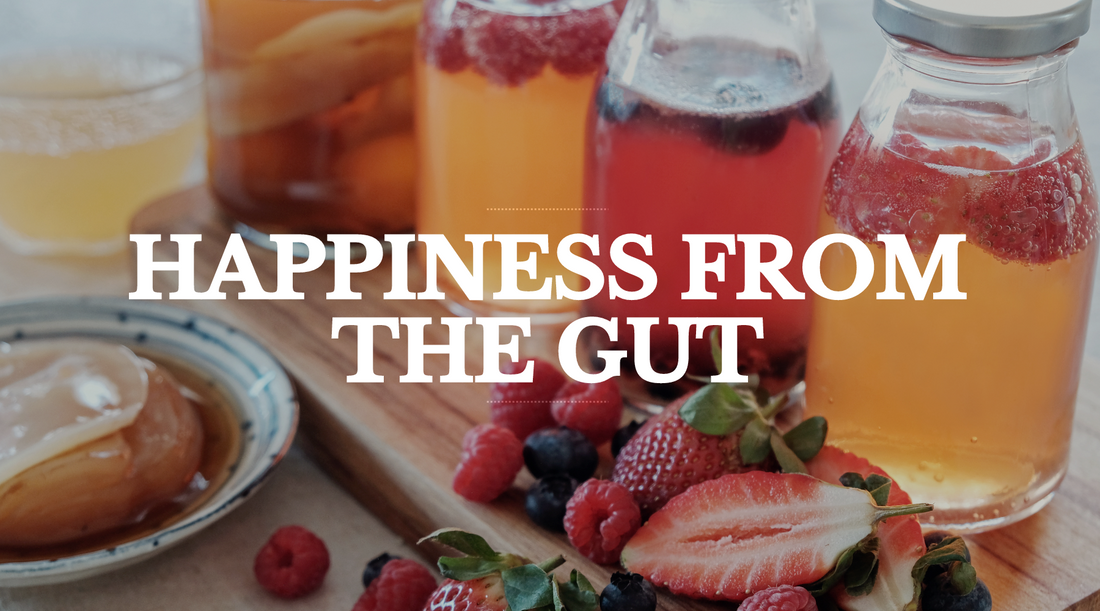
Happiness starts from the Gut
Share
Introduction
When it comes to achieving happiness and emotional well-being, most of us think of mindfulness, self-care, or therapy. But what if we told you that the secret to lasting happiness might actually start in your gut? As science continues to uncover the profound connection between gut health and mental wellness, it’s becoming clear that the state of your digestive system plays a significant role in how happy, calm, and emotionally resilient you feel. In this post, we’ll explore how gut health directly affects your mood and how you can nurture your gut to cultivate a happier life.
The Gut: Your Body’s Emotional Powerhouse
The gut, often referred to as the “second brain”, is home to a vast network of nerves and neurons that communicate with the brain. This gut-brain connection is the reason your digestive health has such a powerful impact on your mood and emotions. This complex communication happens via the vagus nerve, which connects the gut and the brain, and through the production of key neurotransmitters like serotonin—the “feel-good” chemical.
In fact, around 90% of serotonin, a critical regulator of mood, is produced in the gut. When your gut is healthy and balanced, serotonin levels are optimized, contributing to feelings of well-being, contentment, and calm. However, when your gut health is out of balance, it can disrupt the production of these mood-regulating chemicals, leading to anxiety, stress, and even depression.
The Role of the Microbiome in Happiness
Your gut is home to trillions of bacteria, known collectively as the gut microbiome. These bacteria perform essential functions for digestion, immune support, and mental health. A healthy and diverse microbiome helps regulate inflammation, manage stress responses, and produce the neurotransmitters that control mood.
When the balance of good and bad bacteria in the gut is disrupted— a condition called dysbiosis—it can lead to inflammation not only in the gut but throughout the body, including the brain. Chronic inflammation has been closely linked to mood disorders like depression and anxiety.
-
Good Bacteria = Good Mood: The beneficial bacteria in your gut produce substances like short-chain fatty acids (SCFAs), which have anti-inflammatory effects and protect brain health. A healthy gut also supports the production of dopamine and GABA, which help regulate emotions, reduce stress, and improve sleep.
-
Bad Bacteria = Mood Imbalance: On the other hand, an overgrowth of harmful bacteria can trigger inflammation and impair the gut’s ability to produce these mood-enhancing chemicals, leading to feelings of stress, irritability, and sadness.
Signs Your Gut Might Be Affecting Your Mood
If you often experience feelings of stress, anxiety, or emotional instability, your gut health might be playing a part. Here are some signs that your gut health could be influencing your mental well-being:
- Frequent digestive issues like bloating, constipation, or diarrhea
- Cravings for sugar or processed foods
- Fatigue or sluggishness, even after a full night’s sleep
- Mood swings or irritability
- Brain fog or difficulty concentrating
- Recurring feelings of stress or anxiety
If any of these sound familiar, improving your gut health could help boost your overall mood and happiness.
Gut-Boosting Habits for a Happier You
So, how can you support your gut to enhance your mental well-being? By making simple changes to your diet and lifestyle, you can cultivate a healthier gut environment that promotes happiness and emotional stability.
1. Eat Probiotic-Rich Foods
Probiotics are live bacteria that support the growth of healthy gut microbes. Including more probiotic-rich foods like yogurt, kefir, sauerkraut, and kimchi in your diet can help balance your microbiome and promote a happier mood.
2. Focus on Prebiotics
Prebiotics are a type of fiber that serves as food for your good gut bacteria. Prebiotic foods like garlic, leeks, onions, and asparagus help nourish your microbiome and keep it thriving.
3. Increase Fiber Intake
A fiber-rich diet supports digestion and helps maintain a diverse and healthy gut microbiome. Load up on whole grains, fruits, vegetables, and legumes to promote gut health and improve emotional balance.
4. Reduce Processed and Sugary Foods
Processed foods and refined sugars feed harmful bacteria and contribute to dysbiosis. Cutting back on these foods can reduce gut inflammation and help restore a healthier microbiome, positively impacting your mood.
5. Manage Stress
Chronic stress disrupts the gut-brain connection and can worsen gut health. Practices like mindfulness, meditation, yoga, and deep breathing exercises can help reduce stress and protect your gut.
6. Exercise Regularly
Physical activity improves gut motility and promotes a healthier gut environment. Exercise also triggers the release of endorphins, which naturally boost mood and reduce feelings of anxiety and depression.
The Gut-Immune-Mood Connection
Another important factor linking gut health to happiness is the immune system. About 70% of the body’s immune cells reside in the gut, which means that an unhealthy gut can lead to a weakened immune response. Inflammation and immune dysfunction are known to contribute to mental health disorders, particularly depression.
When you maintain a healthy gut, you’re not only supporting digestion but also strengthening your immune system, which in turn can help improve your mood, energy levels, and overall happiness.
Conclusion: Happy Gut, Happy Mind
It’s clear that happiness truly starts from the gut. By focusing on nourishing your gut microbiome through a healthy diet, regular exercise, and stress management, you can create a positive ripple effect that benefits both your body and your mind. Improving your gut health may be one of the most powerful steps you can take toward boosting your mental well-being and unlocking lasting happiness.
Take action today: start incorporating gut-friendly foods, practice mindfulness, and prioritize your digestive health. You’ll not only feel the benefits in your body but also in your mood and emotional outlook.

